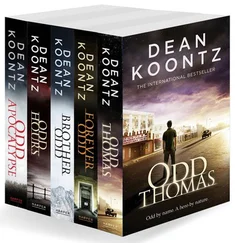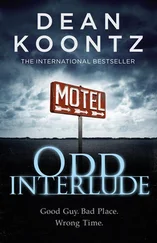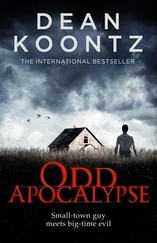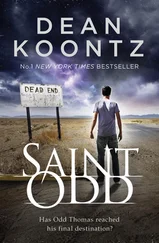“Do you believe, Harry?”
“Deeply. Plus there’s the money.”
“It’s so wonderful to believe.”
“You come so alive when you say the word.”
“Believe,” she said with childlike yearning. “Believe.”
She inhaled noisily, and again.
“Damn these allergies,” she complained, and reached into a coat pocket for a handkerchief.
From under my sweatshirt, from the small of my back, I drew the gun that held two more rounds.
Her compact pistol, a lady’s gun but deadly, hung up on the lining of her coat pocket as she tried to draw it.
“Valonia, don’t.”
The snagged lining tore.
“Please,” I said.
The gun came free, and in her passion to defend the faith, she fired wildly.
In every direction from the bullet hole, the laminated window beside my head instantly webbed to the limits of its frame.
I shot her once, not just to wound, because it never could have been that way.
Golden hair swirled, shimmered, as she spasmed from the impact. She dropped the little gun, and dropped herself, collapsing toward a needed rest, faceup on the stained and soiled deck, an orchid in the mud.
Snaring her pistol, I knelt beside her.
Her eyes were open, but not yet vacant. She stared at something, perhaps a memory, and then at me.
She said, “I’ll never get to see…”
I took one of her hands in both of mine, and I was not assaulted by the vision of a red tide. That future had been thwarted.
“I’ll never get to see…the new world,” she finished.
“No,” I said. “I spared you that.”
Her limp hand tightened on mine.
She closed her eyes. And at once opened them in alarm.
“Don’t let go,” she pleaded, her voice younger now, without sophistication or artifice.
I promised her, “I won’t.”
The strength in her grip increased, became fierce, and then she had no strength at all.
Although she was gone, I still held her hand and prayed silently that she would not add to her suffering by lingering here in spirit.
I wondered who had turned her free mind from the light into the dark, where and how and when. I wanted to find him, her, every one of them-and kill them all.
In the closet where I had discovered a satchel in which to stow the bomb triggers, on a shelf above the hanging rain gear, I had seen what I needed now. I went down to the foredeck, selected two wool blankets, and returned to the bridge with them.
After shaking open one of the blankets, I refolded it lengthwise to make a soft and simple catafalque on which to place her.
I lifted her in the cradle of my arms and moved her onto the woolen cushion. She proved to be lighter than I expected. She was petite but had projected herself larger in life.
Before her eyes locked open, I closed her lids with my thumbs and held them for a moment. I placed her right hand atop her left, on her breast.
I shook out the second blanket, folded it much like the first, and covered Valonia Fontenelle, who after all would never be famous. Or infamous.
Questing fog crept across the threshold, seduced by the warmth of the bridge. I stepped outside and closed the door.
I threw Birdie Hopkins’s handgun into the sea.
At the railing on the open portion of the bridge deck, I stood for a while, staring down at what the fog allowed me to see of the rolling ocean.
Within half an hour, I had killed three men and a woman-but I had not murdered anyone. I combed the fine hairs of philosophy, assuring myself that I had found the part between moral and immoral.
With no one at the helm, the action of tides and currents had begun to turn the tugboat in the lazy vortex that nature preferred.
On the blue lake of abiding hope, the sun had been warm and every soft breeze a caress, and the future had waited to be dreamed.
Below me now, the ocean was not blue, and I could not see any hope in it, but the ocean did abide.
ON MALO SUERTE LAKE, NEAR PICO MUNDO, I had on occasion, for pay, driven sportfishing boats of a size to host parties, but I had never been behind the helm of a vessel as large as the tugboat. I had not driven anything on the open ocean, either.
The control console was similar to those on sportfishers. Port-engine clutch and starboard-engine clutch to the left, wheel in the center, port throttle and starboard throttle to the right. Near the throttles, a switch marked ENGINE STOP. The gauge board: gear-oil pressure, engine-oil pressure, water temperature, voltmeter, tachometers, bilge and fuel alarms.
Because the tug had a state-of-the-art GPS navigation system with a large sea-map monitor, I wouldn’t have much need to consult the compass. On the screen now, I could see the boat’s position at the center, the relevant portion of the California coast on the right, because the vessel currently faced north.
For a moment, I studied the radar display as the heading flash picked out pips. Revealed were the same number as before, none of them closer, and one- Junie’s Moonbeam -much farther away.
Either Utgard had turned off the depth-finder or, because of his familiarity with the area, had never activated it. During the short cruise I would be taking, I wouldn’t need sonar until near the end, but I switched it on.
I tried not to think about the dead woman on the deck nearby and the three other corpses aboard. I focused on the task of getting the nukes to a place from which they could not easily be transshipped before trustworthy authorities could gain possession of them.
The tugboat faced north. The abandoned boatyard south of Rooster Point, where trucks waited to transport the bombs to distant cities, also lay to the north.
As I began to bring the tug around to the south, a phone rang with the most familiar notes of “Ode to Joy.” It had been left atop the gauge board, directly in front of me.
Most likely, this was Utgard’s phone. By now, he should have confirmed to someone onshore that the nuclear weapons had been received from Junie’s Moonbeam and that he was proceeding to the rendezvous at the boatyard.
I doubted that Mr. Sinatra’s paranormal rampage had disabled Hoss Shackett any more than it had Utgard. This incoming call was surely from the chief.
By the time I brought the boat around due south, the call had gone to voice mail, and after a pause, the caller rang again. I let it go to voice mail a second time.
The conspirators onshore now knew something had gone wrong.
Because I had changed the boat’s course 180 degrees, the GPS sea map currently showed the coastline on the left side of the screen. A legend identified the harbor as MAGIC BEACH; and under the words were numbers that meant nothing to me.
Because I had found employees of the harbor department to be arrogant, rude, and homicidal, I declined to give them any more of my business. I would not be returning to the harbor.
Serenaded by the soft ping of radar and by the louder pong of sonar, I throttled up and drove the tugboat south, as if I knew what I was doing, protected by electronics from being misled by singing sea nymphs perched on hull-shredding rocks.
No doubt I remained vulnerable to kraken and other sea serpents of such mammoth scale that they could capsize ships and eat people as casually as we take sardines from the can. I intended to remain aboard for fifteen minutes at the very most, however, so it was not likely that the tug would be seized in the tentacles of a Kong-size octopus and dragged down twenty thousand leagues.
Although the boat had a radio room, the bridge also featured a VHF/FM radiotelephone with a scanner. I had hardly headed south when I received a call on Channel 22, from the Coast Guard cutter with which Joey had been chatting earlier.
Читать дальше
Конец ознакомительного отрывка
Купить книгу

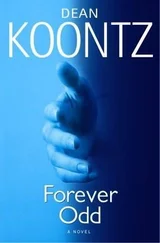
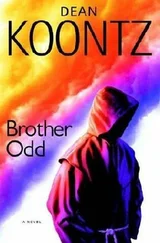
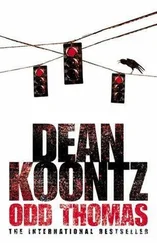



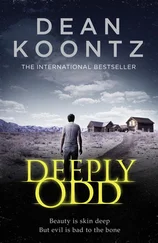
![Dean Koontz - You Are Destined To Be Together Forever [an Odd Thomas short story]](/books/705298/dean-koontz-you-are-destined-to-be-together-foreve-thumb.webp)
